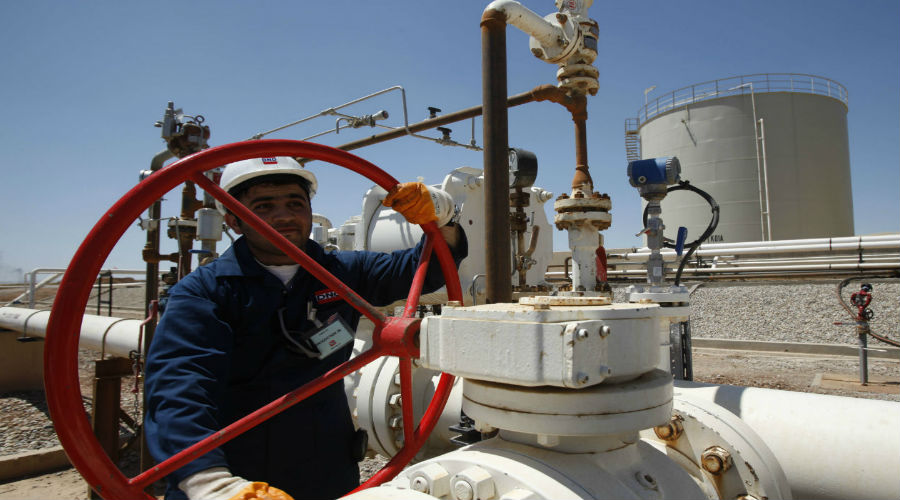Iraq has demonstrated responsiveness to Russian oil companies’ participation in its oil sector. This reflects a bid to overcome issues between the two countries, especially over deals Russia signed with Iraqi Kurdistan in the past months that the Iraqi government did not recognize. There are indications that Russian companies are working to increase investments in Iraq while also consolidating cooperation in other areas, in the military sphere in particular.
According to several views, Baghdad sees obstacles to cancelling Russia’s agreements with Kurdistan at a time when it needs Russian companies’ investments to rehabilitate the oil sector, specifically in Kirkuk. Moreover, rapprochement with the government in Baghdad can enable Moscow to continue its projects in Kurdistan, in addition to getting larger concessions in other Iraqi territories, which would support Russia’s influence in the entire Middle East.
Signs of Rapprochement
Relations between Iraq and Russia have recently witnessed unprecedented economic rapprochement. This was reflected in statements delivered on February 10, 2018, by Russian Deputy Foreign Minister Mikhail Bogdanov, who said that the Iraqi federal government would support Russian oil companies, and noted that issues over Kurdistan were resolved.
In light of this, Iraq supported Russian companies’ plans to increase investments in its oil sector, especially in Kirkuk. On the sidelines of a meeting of the Russian-Iraqi joint committee, held in Moscow on February 28, Iraqi Oil Minister Jabbar al-Luaibi was quoted by Reuters as saying that his ministry has “no objection if Rosneft wanted to expand its work in all of Kirkuk’s oilfields after coordination and agreement with BP.”
Additionally, reducing issues between the two parties over Kurdistan has also paved the way for other Russian firms to increase investments in other Iraqi regions. On March 4, Iraqi Prime Minister Haider al-Abadi met with officials from Russia’s Lukoil to discuss ways to step up production at the 10th exploration blocks between the provinces of Dhi Qar and Muthanna. Simultaneously, other Russian firms are working to develop production capacity from Iraqi oilfields, with including Gazprom planning to invest a further US$2.5 billion in developing the Badra oilfield until 2030.
However, cooperation between the two states is not limited to oil. Recently, it was expanded to include other areas such as participation in Iraq’s reconstruction. Russian deputy energy minister Kirill Molodtsov, on February 20, said, during a meeting with Iraqi officials, that a top priority for Russian companies is also to take part in rehabilitating Iraq’s power stations. Trade between the two countries grew 53 per cent to $1.4 billion in 2017, according to Russian estimates.
Multiple Drivers
This convergence reflects a pragmatic approach to tackling pending issues over Kurdistan. That is, the Iraqi government does not seem to be willing to hold onto its position on economic relations between Russia and Kurdistan, although it continues to be keen to emphasize its sovereignty in this context.
This was evident in statements by Iraqi officials who noted that the central authorities in Baghdad should be respected and should not be overstepped when agreements are signed with Kurdistan. No doubt, what can make Baghdad even more willing to elevate cooperation with Russia is its eagerness to attract support from world powers for rehabilitation operations that can cost up to an estimated $88 billion.
On the other hand, Moscow is aware that due to developments that took place in the Kurdistan region after the referendum for independence, it is necessary to enter into a partnership with the central government to implement projects in this region. Oil projects across Iraq, including in Kurdistan, became more attractive for large investments. The government of the oil-rich region signed an agreement with Rosneft for oil exploration in five blocks. The agreement may enable the Russian company to take control of up to 670 million new barrels of oil and get 80 per cent of profits for investing no more than $400 million.
Moreover, the pipeline that the Russian firm is planning to build in Kurdistan will not only elevate the region’s strategic importance, but will also help expand Russia’s influence in the Middle East, and transform Russia into the top exporter of natural gas to both Turkey and Europe. This is especially so because, according to the company’s plans, the pipeline’s capacity is expected to go up to 30 billion cubic meters of gas to be exported to Turkish and European markets starting in 2020.
That is why it was not surprising that the Russian firm is contributing towards de-escalating tensions between the Iraqi government and the Kurdistan Regional Government and even works to increase the chances of both sides reaching a preliminary agreement about resuming full oil exports from the region. This would help the firm implement its oil projects in Iraq without significant difficulty.
This also prompted Iraq to further consolidate military cooperation with Russia. Currently, the Iraqi government is considering the purchase of Russia's S-400 air defense systems, according to statements delivered by Iraqi Foreign Minister Ibrahim al-Jafari. U.S. State Department spokesperson Heather Nauert warned that by purchasing the missile systems, Iraq could run afoul of Countering America's Adversaries through Sanctions Act and that such a deal would impose potential repercussions as a result.
Potential Hurdles
Nevertheless, there are obstacles blocking cooperation between Iraq and Russia, in the oil sector in particular. In addition to United States’ continuous pressure on the Iraqi government to cancel the military deal with Russia, there is real potential that tensions between Baghdad and Kurdistan can break out again. In particular, the federal government trimmed Kurdistan region's share of the 2018 budget to 12.6 percent, down from 17 percent. This cut may once again exacerbate disagreement between the two sides, especially in light of Kurdish parties’ boycott of a vote on the federal budget.
In conclusion, Russian-Iraqi convergence, in the oil sector in particular, reflects their pressing economic and geopolitical interests that are linked to their views of the developments in Iraq after the defeat of ISIS and the ongoing armed conflict in Syria.


